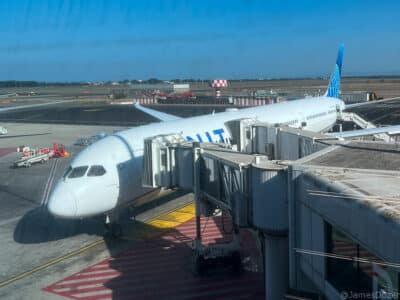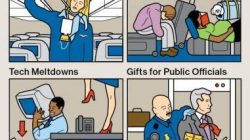Upon discovering earlier this week that two hedge funds have fledged a campaign against the United Airlines’ board to inaugurate six additional members, one being industry veteran Gordon Bethune, I am pretty sure I did a silent clap in my office.
For those who are unfamiliar with Bethune, he was the driver behind Continental’s remarkable comeback in the 1990’s, saving it from its 3rd bankruptcy and instilling an iconic legacy that lasted up until its merger with United in 2010. He even published a book describing the detailed steps he took to save Continental, titled, “From Worst to First.” I highly recommend reading it.
But not everyone agrees that bringing back a 74-year old, retired CEO is such a grand idea. One of them happens to be The Street author Ted Reed, who yesterday published an article titled, “Gordon Bethune is a Star, but he’s not what United Airlines needs.“
In his post, Reed commented that the former Continental CEO is an admirable leader, but his services are not needed right now because United is already in a better place under its current CEO Oscar Munoz.
While I understand Mr. Reed has been writing about the airline industry for decades, I find myself disagreeing his opinion because I think his viewpoint on the situation entirely too simplistic. I fear that such complacency is a prime example of the how airline CEO’s can make fatal decisions, and undermine their credibility instantaneously.
Reed is obviously a huge proponent of Oscar Munoz, like I certainly am as well as many other industry journalists and analysts. I have no doubt in my mind that he’s the ideal leader for United Airlines right now. I’d venture to say that for the first time in commercial aviation history, nearly 100% of the people standing behind United in 2016 – whether it is employees, shareholders, customers, investors and partners – support Oscar based on gut intuition alone. He has a commanding voice that resonates with people because he speaks with authenticity, poise and empathy. In a company of over 80,000 employees where multiple systems are broken, previous leadership has failed to gain trust among them and resentment is running at an all-time high. For change leadership to be effective, and build a culture oriented in trust, transparency and shared goals, everything cascades from the top down.
To that end, I firmly believe that Mr. Munoz will deliver incredible results as long as people are willing to work with him and that his health isn’t compromised further. But we cannot ignore that fact that Mr. Munoz has been on medical leave for the vast majority of his CEO tenure at United. He hasn’t had a chance to implement sustainable systems and procedures with longevity that ultimately prove that his turnaround plan is shatterproof.
Gordon Bethune, on the other hand, does come to United with that proven track record. Better yet, he has an incredible relationship with Oscar Munoz. Bethune was the individual who actually hired Oscar into the board of Continental in 2004. One can assume that they’re cut from similar cloths.
Broadly speaking, tunnel-vision mentality is what has doomed so many airlines over the past two decades. My main concern is that if Mr. Reed’s sentiments were to be shared, and taken at face value, by United’s board (still very much dealing with a broken airline), then the company would be headed for disaster.
Yes, we all believe in Oscar. But let’s not overlook the fact that, fortunately for United, the industry has been in a place of relative tranquility since Munoz replaced Jeff Smisek last September. The economy is doing well, premium travel has rebounded, oil is cheap, competition has been kept at bay and Boeing and Airbus are delivering new, cost-efficient aircraft. The winter weather season was unusually warm this year, resulting in few, if any, irregular operation days that challenged the usual suspect airports and created havoc irregular operations situations for airlines to deal with.
Gordon Bethune did not have any of those luxuries when he took control of the ailing Continental Airlines in 1994. He essentially rescued it from the brink of insolvency and created a profitable entity in record time.
Aside from ongoing collective labor agreement discussions, few things have rocked the ship at United recently. As such, with or without Mr. Munoz being the face of United on a day-to-day basis, there hasn’t been many “moments of chaos” that have given him a chance to show when he can mastermind a team of competent leaders to implement durable solutions in a pinch.
I still believe those moments will undoubtedly come, and I am confident that Mr. Munoz will start to put motions into place and prepare his team to navigate through the chop once he comes back to work on Monday, March 14. But it is premature to assume that six months into the job, Munoz has proven all of his worth.
Let’s frame it in another fashion: if we were on a plane, and Oscar was your only pilot, do you believe he has all the skills necessary to land the plane safely in a disruptional scenario?
Here is a reason why I am skeptical of Reed’s opinion: in his article, he writes, “since his arrival, Munoz has tried to fix everything – labor relations, operational performance, customer service and the fleet – and he has made progress.”
Well, yes, for the reasons stated above, of course there has been minor “progresses,” but a lot of that has been tied to an unusually calm period in the airline industry. And again, success in multiple metrics has to be continuous over a lengthy period of time before we jump to quick conclusions. Using data only tracing back to September 2015 doesn’t provide a great deal of context nor credibility.
Back to the piloting example: that’s like saying we know with certainty that Captain Oscar is capable of landing the plane during a tornado because we knew the take-off was smooth, disregarding the fact that he’s been away from the cockpit for the past five hours of the flight.
In other words, it is foolish to overestimate Oscar Munoz’ capabilities and disregard Gordon Bethune based on a mere few weeks of leadership experience at a sick company.
Remember, United still is largely operating as two separate entities from a frontline and customer-facing perspective. The United employees and Continental employees still like to align themselves in different camps. They are not one airline, one culture, one team, as much as they wish to be considered as such.
And, in order to be successful in the long run, they cannot be run as the pre-merger US Airways was run with the, “East versus West,” band-aid approach that now American Airlines has inherited. They need an effective leader who understands that the wounds need to heal and stitch over time. Until Munoz shows that he doesn’t just stick band-aids onto problems, we can’t just fall into the trap of siloed, tunnel-vision mentality that has ultimately plauged so many legacy carriers.
Mr. Reed fails to realize, by his own rhetoric, that Gordon Bethune lived through multiple mergers in the airline industry to understand how integrating labor forces creates a huge milieu for toxic energy, culture clashes and unproductivity. This was the exact scenario that Bethune inherited when he took the lead at Continental in 1994. Within record time, Bethune managed to turn the airline around from near-liquidation to profitability. Key to that success, as part of his Go Forward Plan, was bringing his team together to unite as one and share a common goal.
For Mr. Reed to say that a large portion of Bethune’s success is attributable to predecessor Frank Lorenzo’s successful build-up of high-yielding hubs in Houston and Newark does extreme injustice to Bethune’s legacy. You can have hubs in the most lucrative markets in the world and still fail. Look what’s happened to Pan Am, TWA, Braniff, Eastern – premier airlines with hubs in New York, Miami, Washington, D.C., on and on. Those airlines failed because of poor leadership, bloated cost structures and labor forces unwilling to work together to save the company. The hubs had nothing to do with that.
He also compared Frank Lorenzo’s cost-cutting initiatives to present-era decisions that Jeff Smisek left, arguing that Oscar Munoz has similarly inherited leaned-out cost structure at United. Well, I am not sure if Reed has read, “From Worst to First,” but one of Bethune’s most noteworthy chapters begins with the title, “Fly to Win, or Make a Pizza so Cheap Nobody Wants to Eat it.”
I don’t want to speak for all of United’s customers and shareholders, but I think there is a common consensus that Jeff Smisek’s cost-cutting legacy created a United product that was equally bad in 2016 as Gordon Bethune inherited at Continental in 1994. Look no further than United’s Net Promoter Score and Customer Satisfaction rankings and you have your answer.
Shifting the focus back to Oscar, and whether or not Gordo has a place in the new United, I think it is safe to say that offering Mr. Bethune a seat on the Board of Directors is much more rational decision than telling him to step out of the way. Moreover, I think it is clear that Bethune knows his place this time around as much as ever: he’s not the one calling the shots, but he is there to provide the support that Munoz undoubtedly will need.
The other important thing to remember is that Gordon, like Munoz, has shown that his heart is in this race. Winning is everything in the airline industry, and United has been far from a winner (or a consistent winner, to put it more precisely). Rather than create more alienation and inject unnecessary negative energy into the universe, accusing Gordon of being brought in at an inopportune time, it would be wise for the naysayers to remember the importance of not biting from the hand that feeds you.
Munoz will steer United out of the storm, avoid a diversion and bring his team to safety. But it never hurts to have a seasoned co-pilot in the jump seat.
Let’s welcome Gordy to the new United, and forget about the delays and headaches of the past.
It’s time to Fly.





